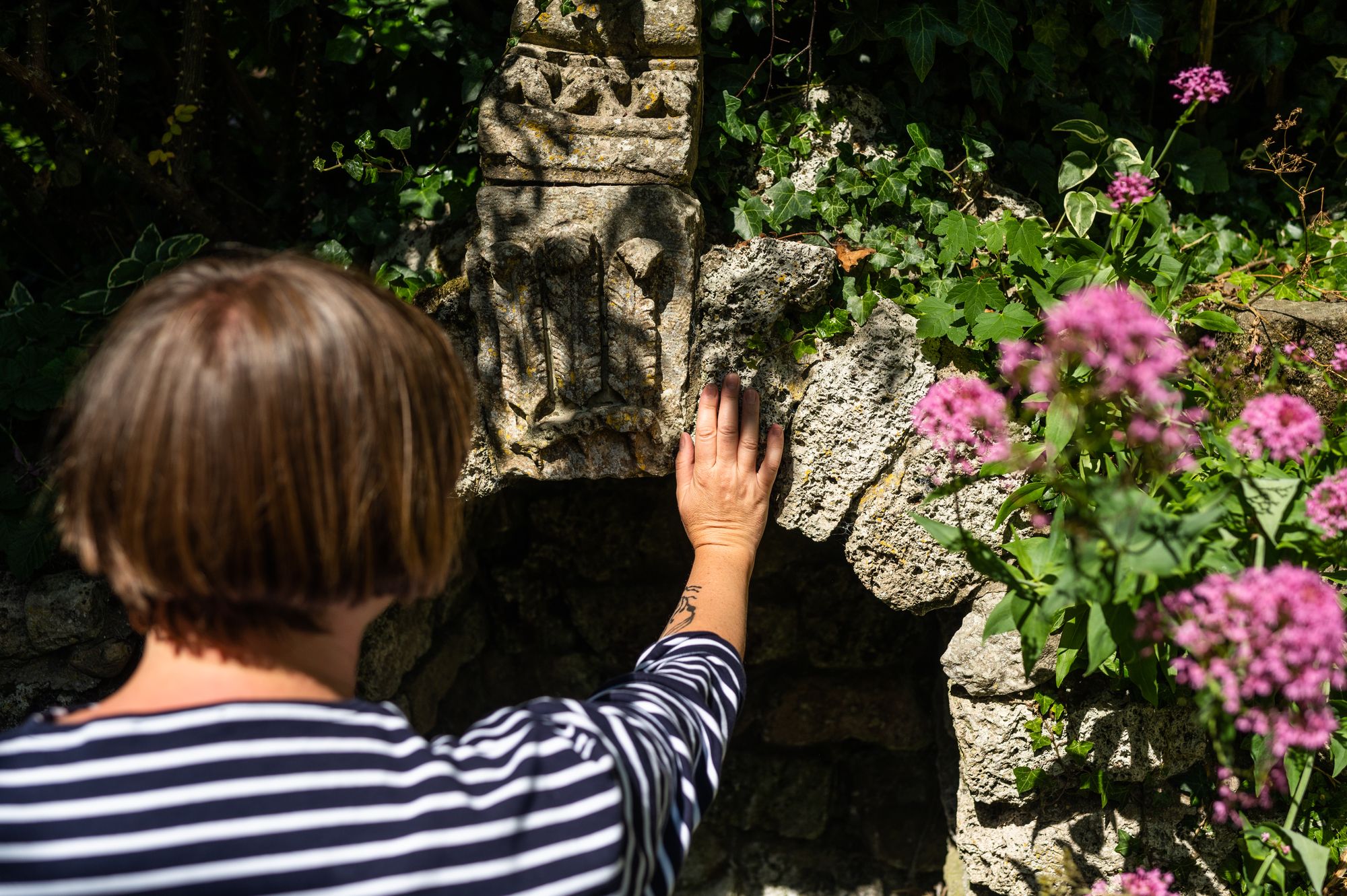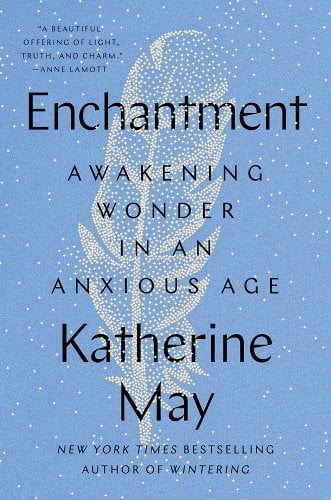Want to Feel More Enchantment in this Anxious World? Katherine May Learned How. Here's How You Can, Too
One writer who has invited us to see the deeper truths in ourselves is Katherine May. The author’s bestselling memoir Wintering: The Power of Rest and Retreat in Difficult Times, in which she candidly writes about a hard period in her life, offered a sense of permission to lean into the emotional discomforts life throws our way.
May continues to divulge personal difficulties in her new book, Enchantment: Awakening Wonder in an Anxious Age. Written in similar memoir-style prose, Enchantment chronicles how May fell into anxiousness and burnout during the pandemic. Simple pleasures, like walking and reading, offered no reprieve. May yearned, as she writes, “to be enchanted again.” With each page, she describes how simple actions led her to slowly open herself back up to the wonders all around us, those “small doses of awe, almost homeopathic: those quiet traces of fascination that are found only when we look for them.”
While Enchantment is as honest and raw as her previous works, May says writing this book was different. It changed her. She spoke with The Sunday Paper about what she learned while creating it. She also tells us how finding enchantment is both needed and available to all of us: “I think the pleasure and joy become all the more necessary in truly challenging eras like these.”
A CONVERSATION WITH KATHERINE MAY
In Enchantment, you describe a scene: stacks of books all around you, almost like they’re consuming you. You then go on to describe the fear and change filling the world. You write, “the rolling news cycles, the chatter on social media, the way that our families have split along partisan lines: it feels as though we’ve undergone a halving, then a quartering, and now we are some kind of social rubble.” What does all this reflect about our lives today?
My world of books has always been the place I go to for rest, and a sense of safety. But even that came to symbolize an onslaught—of media and voices that I just didn’t feel I could cope with anymore.
And that sense of fear I began to notice more strongly. We’ve all become more and more afraid of each other. I had traveled to New York state over the summer, and it was the first I had been to America in a long time. In preparation for my trip, everyone told me to ‘avoid this’ or ‘avoid that’ or ‘don’t talk to these people or that person.’ There was this sense of how afraid of each other Americans were, but that would be true of people in my country now, too. We’ve gotten to the stage now where we’re warning each other against the other. Then we wonder why we’re so exhausted. We’re all scared of everything around us, and it all seems very menacing. There’s a constant sense of running—running away, escaping, looking over our shoulders, checking that everything's okay and not feeling okay. And then we're wondering why we are feeling so burnt out.
As you’re feeling this, you say that you wanted to be enchanted again. What do you mean?
It’s interesting because I wondered for a long time if I was even allowed to say that, given the circumstances that I've just outlined. Are we allowed to want something beautiful in these times that we acknowledge are so dark? But that’s what enchantment is to me: It's this reaching towards a sense of flow with the world, a sense of contact with our fascination and awe and wonder, and the humbling effects of really engaging with the enormity of the universe that we stand in, in a very literal way.
It’s also about that permission to make meaning again, to not feel like we're entering an apocalypse, to not feel nihilistic, to not feel like the world might crash in around our heads and everything is hopeless. That question, for me, derives from asking how we survive these times and live a good life. Because I do think it's possible. And I think it's crucial.
You also take us back to your childhood when you had these tactile moments of sensory exploration. Enchantment “came from a deep engagement with the world around you” when you were young, you write. Why did you, and why do we, lose this as we age?
I actually think we lose it quite deliberately. I lived a quiet childhood in a quiet family. In a lot of ways, those moments of enchantment were easy for me to find because there was a lot of spaciousness in my days. I’d have to go off and find things to entertain myself. I had these, as you say, deeply tactile relationships with the world around me that could just engage me for a few minutes or a few hours. As I got older, those things began to feel silly to me, honestly. And I felt like I had to give up on them. I felt like it was embarrassing to get interested in a rock in the garden or to have a deep engagement with the petals of a flower or a bird. When I was even older, I felt like I had to identify with the rational people, like I had to pick sides and that I would've felt embarrassed to be engaging in something as delicate as enchantment. It was only a little later that I began to miss that and to feel like I'd lost something and didn't know how to get it back.
I don't think I'm the only one that did that, that kind of deliberately walked away from the magic.
You believe that our bodies have answers to questions that we don't even know how to ask. Why do we need to be back in touch with our bodies?
In the society we live in, we do live in our heads. Of course, being online has made us move even further out of our bodies. I call my phone my ‘out brain’ because it holds everything I need and stops me from having to think for most of the day. What we've forgotten and what much more ancient understandings of being human will tell us is that our knowledge, our wisdom, and our perception are distributed through our whole bodies and perhaps even a little bit outside our bodies. Perhaps there's a zone around us where we're sensing and understanding the world. That takes a huge sense of unlearning to find again. It’s almost a process of rewiring, and that involves checking in with your intuition or thinking with your hands without using words.

What have you learned about how to do this for yourself?
I'm a hyper-verbal person, and so it's a massive challenge for me to do that. But I began to realize that when my writing's the most effective, it's when I'm trying to move past words and reach a common feeling that the reader will share with me that I maybe can't explain in something as basic as words. It's richer and deeper and more complex than I can put into words.
The process of writing Enchantment taught me that there's another level of knowing that comes from fully realizing that you are part of this much bigger system. You are part of the massive humanity, and you are also part of a landscape and a bigger natural world. Most of us haven't ever had to engage with that and feel truly part of it. We feel very separate from it. Our dislocation from our bodies is more or less the same as our dislocation from nature. We've separated ourselves from this much bigger organism that we're part of. And I'm in the process of learning to get back into it.
You’ve been honest about how you “ran out of charge” at times when writing Enchantment. Now that the book is out in the world, what else have you learned?
I feel permanently changed by writing Enchantment and I didn't notice it until I started doing this round of publicity. Coming back to it has made me conscious of the fact that I now am more comfortable having a conscious spiritual relationship with every day and with looking for those moments in the everyday. That involves loads of small things. There’s no big religious practice for me, but I am consciously making the space around me into something that feels sacred.
That’s a huge change for me. I’ve let go of some resistance and embarrassment that I felt in the face of that up to now. It feels vulnerable to talk about that, much more than it ever did to talk about my autism diagnosis or health problems that I talked about in Wintering. This shift has changed my mode of living genuinely and I hope will be permanent.
We must get comfortable with the incompleteness of things. The fact that we'll always be seeking and changing, we must get comfortable with that rather than wanting to find a final answer. That’s what I get better at as I get older: Realizing that there is no finality and that I want to continue to be on that quest to understand the world.
Do you believe enchantment is available for all of us to find?
Absolutely. I hope that when people read Enchantment, the thing they'll leave with is the sense that it's right there for them wherever they are. That’s it’s not in this special location that they have to travel thousands of miles to reach. Enchantment is no more next to a grand waterfall than it is under a leaf in your back garden. Or, as I write, in an alleyway behind my house, where I found this amazing crop of wildflowers that took my breath away.
We’ve been badly led astray in this belief that to find wonder we have to go anywhere special. That's a myth, and I think it's keeping us from having that contact that we so desperately need.

Katherine May is an internationally bestselling author and podcaster living in Whitstable, UK. Her bestselling hybrid memoir Wintering: The Power of Rest and Retreat in Difficult Times was shortlisted for the Porchlight and Barnes and Noble Book of the Year. The Electricity of Every Living Thing, her memoir of a midlife autism diagnosis, was adapted as an audio drama by Audible. You can learn more about her journalism and essays at katherminemay.co.uk and order her new book Enchantment: Awakening Wonder in an Anxious here.
Question from the Editor: Where can you find enchantment in your life, today? We’d love to know in the comments below.




